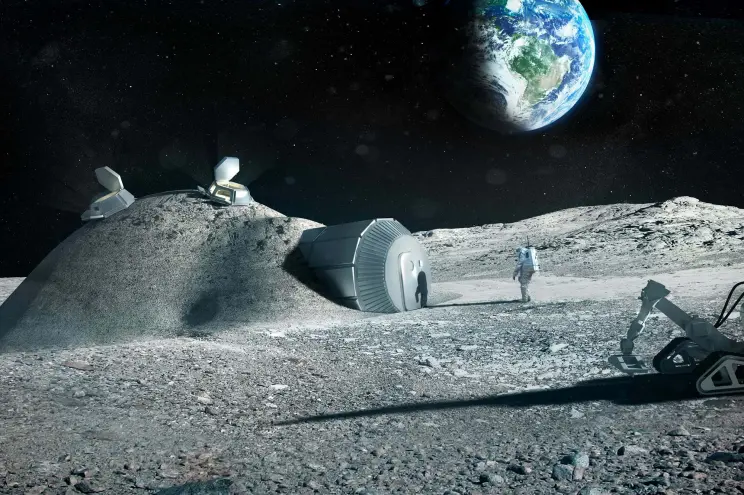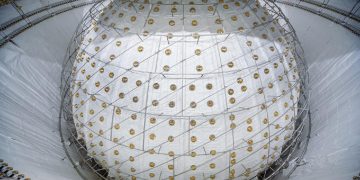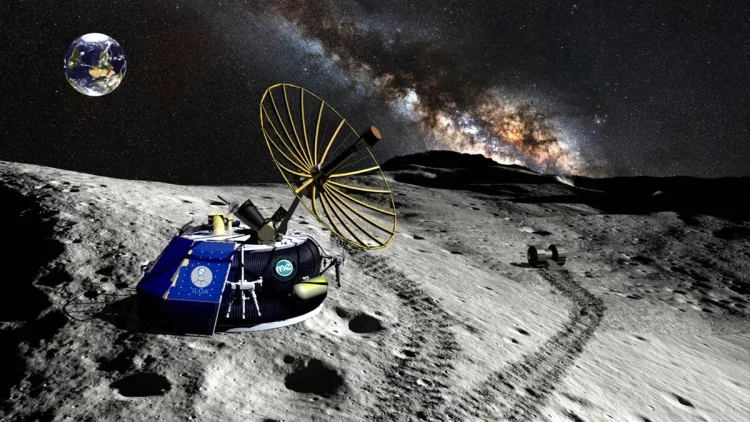Introduction
Space tourism, once thought to be a distant dream, is steadily becoming a reality. With technological advances, growing interest from private companies, and the rise of billionaire space entrepreneurs, the prospect of vacationing beyond Earth is no longer confined to science fiction. One of the most exciting and ambitious goals within the realm of space tourism is the prospect of lunar tourism—vacationing on the Moon. While it may sound like something from a futuristic utopia, the race to make this a reality is already underway. This article will explore the current state of space tourism, delve into the technical challenges of lunar travel, examine the commercial progress being made by private companies, and discuss the broader social, ethical, and economic implications of vacationing on the Moon.
1. The Emergence of Space Tourism: A Brief Overview
1.1 From Dream to Reality: The Origins of Space Tourism
The concept of space tourism dates back decades, with early visions of commercial flights to space being put forth by science fiction writers. However, it was only in the late 20th and early 21st centuries that space tourism began to transition from a futuristic idea to an actual industry. In 2001, American businessman Dennis Tito became the first “space tourist” to visit the International Space Station (ISS) aboard a Russian Soyuz spacecraft, paying $20 million for the privilege.
Since then, several private companies and entrepreneurs have worked to make space travel more accessible to civilians. Companies like Virgin Galactic, SpaceX, and Blue Origin have been at the forefront of space tourism development, each with different approaches to what space tourism could look like and when it could become commercially viable.
1.2 Current Trends in Space Tourism
Today, space tourism is in its infancy, but significant progress has been made. Suborbital flights, such as those offered by Virgin Galactic and Blue Origin, are already giving paying customers brief experiences of weightlessness and views of Earth from space. These flights are relatively short (lasting only about 10-15 minutes), but they are important steps toward more extended space travel.
The next frontier in space tourism is orbital tourism—visiting destinations like the ISS for several days or weeks. SpaceX has been making strides with its Crew Dragon spacecraft, which has already carried astronauts to the ISS under NASA’s partnership. Soon, private citizens could be traveling to space for weeks at a time for a unique vacation experience.
But the real dream of space tourism for many is a lunar vacation—being able to travel to the Moon, stay in lunar hotels, and gaze back at Earth from the lunar surface. Although lunar tourism remains years (or even decades) away, several private companies are already laying the groundwork for these ambitious plans.
2. The Technical Challenges of Lunar Tourism
2.1 The Journey to the Moon: A Long Road Ahead
While suborbital flights are now a reality, traveling to the Moon involves many more technical hurdles. The journey to the Moon is approximately 384,400 kilometers (238,855 miles) from Earth, taking a spacecraft about 3 days to reach its destination. The distance itself presents several challenges for space tourism ventures, such as long-duration spaceflight, spacecraft reliability, and life support systems.
To make lunar tourism feasible, spacecraft need to be capable of carrying not just passengers, but also the necessary fuel, food, and equipment for the journey. The spacecraft must also have the necessary shielding to protect passengers from harmful radiation exposure during the trip.
2.2 Lunar Landing: Designing a Safe and Comfortable Moon Base
Once space tourists arrive at the Moon, they must safely land and navigate the lunar surface. This requires developing technologies that can land large payloads on the Moon—no small feat considering the Moon’s lower gravity and lack of atmosphere. Landing safely, especially with the delicate nature of human life onboard, will require advancements in landing technologies and spacecraft design.
Space tourists would also need a habitat that is safe and comfortable for long stays on the Moon. Lunar habitats need to provide life support systems, including air, water, temperature regulation, and protection from radiation. These habitats must also be able to handle the extreme temperatures and dust storms that characterize the lunar surface.
2.3 Overcoming the Moon’s Harsh Environment
The Moon is a harsh environment for humans, with temperatures ranging from -173°C (-280°F) at night to +127°C (260°F) during the day. Moreover, the lack of an atmosphere means there is no natural protection from cosmic radiation, which can increase the risk of cancer and other health issues.
Lunar tourists would need to be protected from radiation by special spacesuits or habitat shielding. Additionally, long-term exposure to the Moon’s gravity, which is only 1/6th that of Earth’s, may pose unknown health risks. Research is ongoing to understand how the human body will adapt to such environments and what long-term effects may occur.

3. The Commercial Race to the Moon
3.1 SpaceX: Aiming for the Moon and Beyond
SpaceX, led by Elon Musk, is one of the key players in the race to make lunar tourism a reality. SpaceX’s Starship, a fully reusable spacecraft, is being designed to carry both cargo and passengers to the Moon, Mars, and beyond. In 2023, SpaceX plans to send the first private citizen on a mission around the Moon, marking a historic milestone in space tourism.
Elon Musk’s vision for the future of humanity includes building a self-sustaining colony on Mars, but he sees the Moon as an essential stepping stone. The Moon’s proximity to Earth makes it an ideal starting point for future interplanetary travel, and the Starship program aims to make this journey more affordable and accessible.
In collaboration with NASA’s Artemis program, SpaceX is expected to play a significant role in landing astronauts on the lunar surface, with the goal of establishing a sustainable presence on the Moon by the 2030s. As the technology becomes more refined and the cost of missions decreases, SpaceX is expected to lead the charge for private lunar tourism.
3.2 Blue Origin: Aiming for Sustainable Lunar Exploration
Blue Origin, founded by Amazon’s Jeff Bezos, also has ambitions for lunar tourism. The company’s Blue Moon lander is designed to transport cargo, including lunar habitats, to the Moon, with the goal of enabling human missions in the near future. Blue Origin envisions a future where millions of people live and work in space, and they see the Moon as a critical component in this vision.
Through partnerships with NASA and other private companies, Blue Origin is developing technology that could support lunar tourism. While its current focus is on suborbital tourism with the New Shepard rocket, Blue Origin’s future plans include lunar landers and infrastructure that could make the Moon accessible to tourists.
3.3 The Commercialization of Lunar Travel: A Growing Industry
The lunar tourism market is still in its infancy, but it is growing rapidly. As technology advances and private companies like SpaceX and Blue Origin continue to make significant strides, the dream of vacationing on the Moon is gradually becoming more feasible. In addition to direct lunar missions, companies are exploring ways to offer lunar experiences through orbital travel, such as lunar flybys or stays in lunar hotels in low Moon orbit.
Several luxury travel agencies are already expressing interest in creating exclusive lunar vacation packages, offering wealthy clients a once-in-a-lifetime opportunity to experience the ultimate adventure.
4. The Social and Economic Impacts of Lunar Tourism
4.1 The Environmental and Ethical Considerations
The advent of lunar tourism raises important questions about the ethical implications of human activities on the Moon. With the Moon being a unique and pristine environment, there are concerns about the impact of human activities on its surface. The risk of contamination, the potential disruption of lunar ecosystems (including permanently shadowed regions that may harbor water ice), and the environmental footprint of launching missions to the Moon all need to be addressed.
The commercialization of space also raises issues about the growing divide between the wealthy and the rest of the population. While space tourism offers a new frontier of opportunity for some, it also brings to light questions about accessibility and inequality. Will lunar tourism only be available to the ultra-rich, or will it eventually become a more democratized experience?
4.2 Economic Opportunities and Space Policy
Lunar tourism could unlock significant economic opportunities, not only through direct revenues from ticket sales but also in the form of ancillary industries. Lunar missions could lead to the development of new technologies and innovations that have broader applications here on Earth. This includes advances in materials science, life support systems, and propulsion technologies.
Governments and international space agencies will also need to consider how to regulate space tourism and ensure the safety and fairness of lunar travel. National and international space policies will need to be updated to address issues such as space debris, the rights to lunar resources, and the governance of space tourism activities.
5. Conclusion: How Close Are We to Vacationing on the Moon?
While the dream of lunar tourism is not yet a reality, we are closer than ever to making it happen. With advances in spacecraft technology, growing commercial interest, and increasing collaboration between private companies and governmental space agencies, space tourism—specifically lunar tourism—has entered a new phase of possibility.
Though there are significant technical, ethical, and logistical challenges to overcome, the ongoing development of space travel technologies suggests that a future where vacationing on the Moon is a reality may not be as far away as we once thought. As private companies continue to push the boundaries of space exploration and develop the necessary infrastructure, lunar tourism could become a new frontier in human exploration, expanding the very idea of what it means to travel and experience the wonders of the universe.












































Discussion about this post